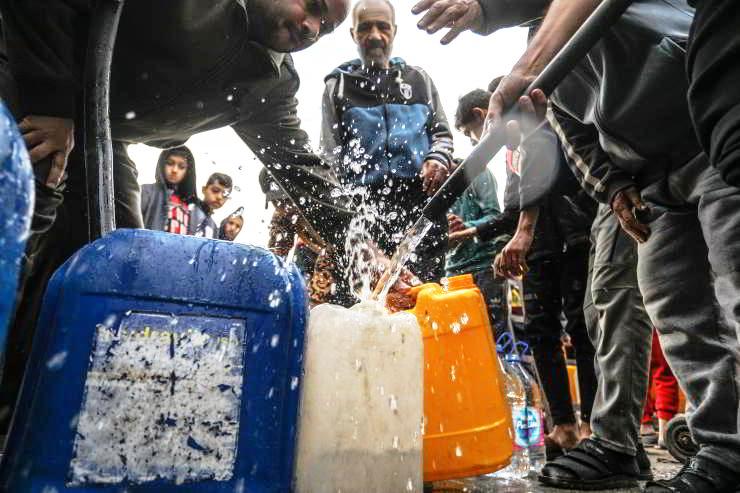Israel/Palestine. The Water War.

Since its birth, the Israeli state has made that precious resource a fundamental element for its development, transforming it into a powerful weapon against its neighbours.
Water is a strategic element on the geopolitical chessboard of the Middle East, particularly in the chronic Israeli-Palestinian conflict. For 76 years, Israel has been waging a silent war against the Palestinians, which the media rarely talks about, or the “water war”.
The Israeli military offensive against Gaza, which has now been going on for a year, has brought to light the issue of water and has shown that Tel Aviv uses it as a weapon against the Gazans to push them to rebel against the Palestinian resistance (which has not happened) and force the population to emigrate to the Sinai desert.
In Gaza, Israel has destroyed the water and sanitation networks. The bombings have put out of action the seawater purification systems, essential sources of supply for the Strip. Furthermore, it has destroyed a large part of the wells.
This situation has forced the inhabitants of Gaza to use polluted water and this has led to the emergence of various infectious diseases, especially among children. However, the problem of polluted water in Gaza is not new. For 17 years, Israel has had an embargo on spare parts for repairs to the Strip’s water systems and has prevented its water supply from the West Bank.
Since its inception, Israel has made water a key element in its development, to the detriment of that of the Palestinians. The Israelis have cornered the major water resources of occupied Palestine. After the 1967 war, which the Arabs lost, Israel occupied East Jerusalem, the West Bank and the Gaza Strip (as well as the water-rich Syrian Golan Heights), and has since exercised control over water sources.
In the West Bank, Palestinians are not allowed to dig water wells. The management and distribution of water resources, both in Israel and in the occupied territories, are in the hands of an Israeli public company, Mekorot. And while Israelis and settlers are well supplied with water, Palestinians in the occupied territories suffer a constant lack
of this essential item.
According to an Oxfam report, the daily per capita amount of water for Palestinians in the occupied territories is 70 litres. The minimum established by the World Health Organization is 100 litres. For Jewish settlers, the average is 300 litres. Settlers who illegally occupy Palestinian lands: there were about 150,000 of them before the Oslo Accords of 1994; today there are more than 700,000.
These agreements have allowed Israel to maintain absolute control over Area C of the occupied territories, where water resources are concentrated, including the Jordan River, now in the hands of Mekorot.
According to Amnesty International, this company also controls rainwater. And the Israeli state prevents Palestinians from even collecting this water. The tanks used for this purpose are destroyed by Israel, which in its territory established by the UN in 1967, did not have sufficient water resources, which is why it occupied Area C of the West Bank. This is one of the reasons why it refuses the creation of an independent Palestinian state within the borders indicated by the UN in resolutions 242 and 338. (Photo: Distribution of drinking water to the displaced people of Gaza City. In Gaza, Israel has destroyed the water and sanitation networks. Shutterstock/Anas-Mohammed)
Mostafa El Ayoubi
Middle East Analyst



